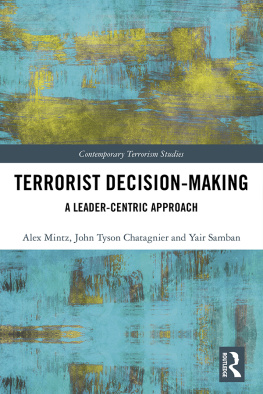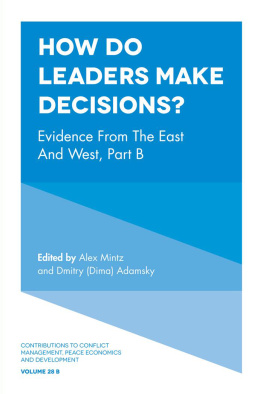Terrorist Decision-Making
This book analyzes a series of decisions by leaders of three major terrorist organizations and identifies a unique Decision DNA for each of them.
The authors use the Applied Decision Analysis methodology to examine organizational and operational decisions made by the leaders of three major groups: Hezbollah (Hassan Nasrallah), Hamas (Khaled Mashal), and al-Qaeda (Osama bin Laden). Decisions that were of critical importance to each organization are identified and analyzed, to uncover the particular decision rule employed by the leader in question and to establish their Decision DNA. A Decision DNA is unique to each leader and can be used to explain previous decisions or predict future choices. The authors demonstrate that the findings presented can be used to promote effective counterterrorism measures, and they provide a series of policy implications that arise from their examination of each leader.
This book will be of much interest to students of terrorist studies, political violence, security studies, and Middle Eastern politics.
Alex Mintz is Provost of the IDC Herzliya, Israel, and former president of the Israeli Political Science Association.
John Tyson Chatagnier is Assistant Professor of Political Science at the University of Houston, USA.
Yair Samban is a researcher affiliated with the Behavioral Political Science Lab at the IDC Herzliya, Israel.
Contemporary Terrorism Studies
Hamas, Popular Support and War in the Middle East
Insurgency in the Holy Land
Richard Davis
Transnational Organized Crime and Jihadist Terrorism
Russian-Speaking Networks in Western Europe
Michael Fredholm
Victims and Perpetrators of Terrorism
Exploring Identities, Roles and Narratives
Edited by Orla Lynch and Javier Argomaniz
Understanding Deradicalization
Methods, Tools and Programs for Countering Violent Extremism
Daniel Koehler
Deterring Terrorism
A Model for Strategic Deterrence
Elli Lieberman
Jihadism Foreign Fighters and Radicalisation in the EU
Legal, Functional and Psychosocial Responses
Edited by Inmaculada Marrero and Humberto Trujillo
Terrorist Decision-Making
A Leader-Centric Approach
Alex Mintz, John Tyson Chatagnier and Yair Samban
For more information about this series, please visit: www.routledge.com/Contemporary-Terrorism-Studies/book-series/CTS
Terrorist Decision-Making
A Leader-Centric Approach
Alex Mintz, John Tyson Chatagnier and Yair Samban
First published 2020
by Routledge
2 Park Square, Milton Park, Abingdon, Oxon OX14 4RN
and by Routledge
52 Vanderbilt Avenue, New York, NY 10017
Routledge is an imprint of the Taylor & Francis Group, an informa business
2020 Alex Mintz, John Tyson Chatagnier and Yair Samban
The right of Alex Mintz, John Tyson Chatagnier and Yair Samban to be identified as authors of this work has been asserted by him/her/them in accordance with sections 77 and 78 of the Copyright, Designs and Patents Act 1988.
All rights reserved. No part of this book may be reprinted or reproduced or utilised in any form or by any electronic, mechanical, or other means, now known or hereafter invented, including photocopying and recording, or in any information storage or retrieval system, without permission in writing from the publishers.
Trademark notice: Product or corporate names may be trademarks or registered trademarks, and are used only for identification and explanation without intent to infringe.
British Library Cataloguing-in-Publication Data
A catalogue record for this book is available from the British Library
Library of Congress Cataloging-in-Publication Data
A catalog record has been requested for this book
ISBN: 978-0-367-19628-8 (hbk)
ISBN: 978-0-429-20352-7 (ebk)
Typeset in Times New Roman
by Wearset Ltd, Boldon, Tyne and Wear
Contents
The authors thank Eldad Tal-Shir for research assistance.
was co-authored by Leehe Friedman.
was co-authored by Ronny Donyetz Rosenzweig.
In this book, we present a leader-centric approach to terrorism decision-making. We claim that while individual terrorists, cells of terrorists and other networks of terrorists make many tactical decisions, it is the leadership of terrorist organizations that makes the key strategic decisions. We therefore attempt to uncover the logic of terrorist leaders decision-making using rational and psychological models of decision-making. To this end, we outline and implement a new strategy and method for uncovering terrorist leaders decision rules.
Most studies of terrorism have focused thus far on the motivations of terrorists generally and suicide terrorism specifically. Nationalistic, religious and economic motives, as well as the desire for revenge, the existence of a charismatic leader and a significant quest have been found to motivate terrorists (see Post 1998; 2007; Kimhi and Even 2004; Harrison 2006; Post et al. 2009; Merari 2010; Perry et al. 2018). This research has contributed significantly to our understanding of terrorism and the suicide terrorists mind. Nonetheless, it did not go into the strategic calculus and logic of terrorist leaders decisions. Terris (2010, 1) however, has pointed out that the study of international political events, such as terrorism, has shifted focus from states to leaders as the main unit of analysis. According to Terris (ibid.), leaders decisions are the proximate cause of events that drive international politics. It is the leader of the terrorist organization who makes the important decisions, even if there are a number of loose networks of terrorists that operate worldwide (see also Hermann and Sakiev 2011). The book therefore extends prior research on terrorism (e.g., Post 2007; Berman 2009; Merari 2010; Juergensmeyer 2017) by attempting to understand how leaders of terrorist organizations make decisions. We do so by uncovering the Decision DNA or Decision Code of leaders of terrorist organizations.
Traditional terrorist campaigns are seldom the work of an individual terrorist acting alone. Instead, terrorist acts are usually parts of coordinated campaigns, directed by a larger organization (Pape 2003). Recent studies point to the important role played by terrorist leaders in maintaining organizational integrity and ensuring that the group operates efficiently. Abrahms and Potter (2015) show that effective leaders can solve principle agent problems, allowing groups to target their attacks appropriately. Groups with leadership deficits are often prone to poor decision-making and unproductive attacks. Meanwhile, Wagstaff and Jung (n.d.) claim that decapitation (or leader capture) strategies can significantly reduce the effectiveness of terrorist groups.
Research focusing on the leaders of the terrorist organization as the unit of analysis is therefore essential to our understanding of this important phenomenon. As Berman (2009) pointed out, understanding terrorism, including suicide terrorism, requires understanding the organizations behind suicide terrorism. In particular, the underlying factors that shape decision-making of leaders. Some (e.g., Sageman 2004; 2008) have argued that












